Khwāja Muʿị̄n-al-Dīn Chishti: A Beacon of Service, Love and Devotion
The world is a highly capricious place, it can appear in varied forms to different onlookers. The raging sea can be a profound source of serenity for the man on a safe shore, whereas it is nothing but impending doom for the drowning sailor. This world, in the language of the mystics, is imbued with veils at every step of realization. It’s a seemingly never-ending venture into uncovering each of these veils according to one’s own ‘taste’ or ‘Ḍhawq’. Each and every creation in the natural world has an innate meaning and message and is, therefore, a ‘sign’ or ‘Āyah’ of the Unseen, a passage into the metaphysical and, ultimately, the supra-natural realm. The Almighty says in the Qur’ān: “And of His signs is the creation of the heavens and the earth, and the difference of your languages and colours. Lo! Herein indeed are signs for men of knowledge.” (16:12) [1]
As is clear, every man cannot fathom realities of Divine nature, rather, there are only a select few who can see through the veils and experience that certainty which for many is all but a distant dream. The Qur’ān addresses these people ‘Qaum’ as ‘al-Ạ̄limeen’, the people of knowledge, ‘al-Ạ̄qiloon’, the people who understand, ‘al-Ạ̄rifoon’, the people who are aware. These are the ones that have transcended their own Nafs or ‘self’ and have entered into the lofty stations of Divine presence. A success which cannot be achieved without cleansing oneself of everything but the Divine. The Qur’ān clearly states: “He is indeed successful who purifies it (his ‘self’); And He has failed who instils it [with corruption].” (91:9-10) [2] One must purge his own carnal desires and cleanse his soul of all material needs before he can achieve such lofty ranks. It wouldn’t be fruitless to mention the German contemplative theologian Meister Eckhart who captures a theme not too dissimilar to the one mentioned in his “Granum sinapis de divinitate” [3] as:
Become as a child,
become deaf, become blind!
Your own substance
must become nothingness;
drive all substance, all nothingness far from you!
Leave space, leave time,
eschew also all physical representation.
Go without a way
the narrow foot-path,
then you will succeed in finding the desert.
Once the above premise is established, it becomes fairly easy to understand that these prudent people who have lived over the epochs, these ‘men of God’ are none other than the Awliyā-ulllāh (sg. Wali-ullāh literal meaning: Friend of God) mentioned in the Qur’ān. The ones who have reached the stature of ‘belovedness’ through spiritual struggles. We cannot begin to fathom their influence in the cosmos; As they see the world not just from human eyes but through the Divine light, they interact with the Universe on a physical scale and at a meta-physical and supra-natural level. It doesn't matter if Newtonian physics does not approve of an extraordinary spiritual manifestation or “miracle”, for meta-physical phenomena which transcend the physical realm are not governed by physical laws. But what matters the most is that the source of such events is a Divine light exhibiting itself in the form of Tajalliyāt or ‘theophanies’. Having said this, in the short treatise at hand, let us have a glimpse at the profound life and marvellous works of one such celebrated figure famously known as “Khwāja Muʿīn al-Dīn Chishti”.
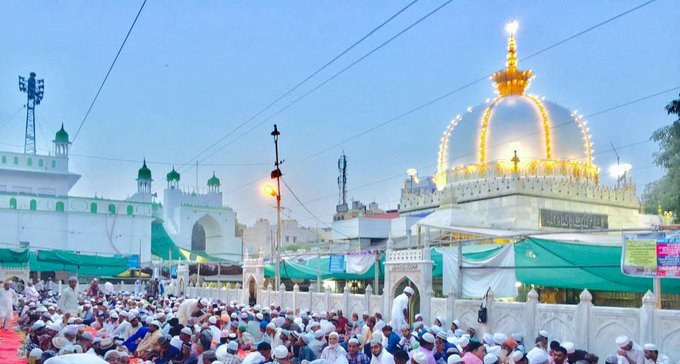
Hazret Khwāja Saheb is known throughout the world and especially in the Indian sub-continent with the dignified titles of Sulṭān-al-Hind, Ạtā-i-Rasool, Khwāja-i-Khwājgān, ‘G̣harīb Nawāz’ and Mu’ị̄n-al-Dīn, meaning ‘The Sultan of India’, ‘The Gift of the Prophet’, ‘The Master of Masters’, ‘The Comforter of the Poor’ and ‘The Proponent of Islam’ respectively. He belonged to the Chishti Sufi Order attributed to Khwāja Abu Is’ḥāq Shāmi who lived in ‘Chisht’ a place near Herat in Greater Khorasan. (Nụ’māni) [4] It is due to Hazret Khwāja’s efforts that Chishti order flourished greatly in India. In fact, most of the medieval Sufis such as Khwāja Quṭub-al-Dīn Bakhtiyār Kāki, Khwāja Niẓām-al-Dīn Auliyā, Bābā Farīd-al-Dīn Ganj Shakar, Makhdoom Ạlā-al-Dīn Ạli Aḥmad Ṣabir Kaliyari, Sufi Ḥamīd-al-Dīn Nagāwri and many more, trace their spiritual roots back to Khwāja Mu'ị̄n-al-Dīn Chishti. (Taḍhkira) [5]
He was born Sayyid Ḥasan in Sīstān or Sajistān, a place in Greater Khorasan in the year 537 A.H. to a noble family of Sayyid G̣iyāth-al-Dīn Ḥasan and Bibi Umm-al-Warạ’, both of whom were Sayyids whose lineage went back to Imam Ḥasan and Imam Ḥussain, the grandsons of The Beloved Prophet Muḥammad (ﷺ). He is sometimes erroneously referred to as Khwāja Ḥasan ‘Sanjari’, a distortion of the original Sajisi (from Sajistan). Hazret Khwāja obtained traditional preliminary knowledge from his noble father, who passed away when he was 15 years of age. For higher studies, he travelled to the lands of Samarkand and Bukhara, the epicentres of knowledge at the time, where he was trained in all prominent traditional sciences, namely Tafsīr, Ḥadīth, Usūl-al-Ḥadīth, Fiqh, Usūl-al-Dīn etc. It is also here that he memorized the entire Qur’ān. (Fayyāz) [6] Hazret Khwāja is said to have always been spiritually inclined, a trait credited to a Divine epiphany he had at a tender age. It is narrated that he used to tend to his ancestral garden daily, a legacy left by his father. Once, a Saintly figure named Ibrahim Qandūri happened to visit the said garden, Hazret Khwāja greeted him warmly and presented a bunch of grapes; he did not accept the offering but took the grape vine, chewed it and put it inside Khwāja’s mouth. This is when Divine theophanies penetrated his heart and soul and all exited from within except ‘the Truth’ (al-Ḥaqq). (Nụ’māni) [7]
After completing traditional studies, Hazret Khwāja set out to quench his spiritual thirst. He aimed to find a credible spiritual master under whom his own spiritual tendencies could blossom and who could show him the way of his pious predecessors. His search took him from Samarkand to Iraq and then to Nishapur and finally culminated at the township of Hārvan, where he met Shaykh-al-Shuyūḳh Hazret Khwāja Uthman al-Hārvani Chishti. Here, he pledged his allegiance to Khwāja Uthman and started his spiritual training. (Fayyāz) [8] Most of the biographies concur and suggest that he spent almost 20 years in the tutelage and service of his Shaykh. Hazret Khwāja was so obedient and devoted that he carried the Shaykh’s belongings on his head while travelling. The Shaykh also acknowledged his devotion and loved him dearly, he is reported to have said once: “Mu'ị̄n-al-Dīn is the beloved of Allah and I am content with his disciplehood”. (Mūnis) [9] Another narration says that once the Shaykh was praying for his beloved disciple and heard a glad tiding from the Unseen saying: “Mu’ị̄n-al-Dīn is our friend, we have accepted him and granted him piety”. (Mūnis) [10]
Hazret Khwāja travelled a lot with his Shaykh, he accompanied him to meet the most pious people of the time, visiting places like Sewastan meeting Hazret Shaykh Ṣadr-al-Dīn Sewastani and Badakhshān where he met a one-legged Dervish. He also went for Ḥajj (the Holy pilgrimage) with Shaykh Uthman to the lands of Mecca and Medina. Sources say that it is here that Hazret Khwāja was appointed to the Indian sub-continent for the propagation of Islam by none other than the Beloved Prophet Muḥammad (ﷺ) himself in a Divine encounter. Undoubtedly, Shaykh Uthman sculpted his disciple to complete mastery and imbued him with immense colours of eternal wisdom before departing from the world. After his Shaykh’s demise, Hazret Khwāja continued to journey and explore the horizons of the spiritual realm, meeting different Sufi Masters of his time. He met with Abul Jannāb Shaykh Najm-al-Dīn Aḥmad bin Ụmar al-Kubrā al-Khwārizmi better known as Shaykh Najm-al-Dīn Kubrā in Sanjān and spent two and a half years in his service. He also went on to visit the land of Jīl in Baghdad and spent fifty-seven days in the blessed court of Sulṭān-al-Auliyā Shaykh Ạbd-al-Qādir al-Jīlāni al-Baghdadi. In the same Baghdad, Hazret Khwāja came in contact with the famous Shaykh Ḍiyā-al-Dīn Suharwardi. He also happened to visit the shrines of the following Sufi Masters: Shaykh Abul Ḥasan Ḳharqāni, Shaykh Yūsuf Hamdāni, Shaykh Ạli bin Uthman alias Data Ganj Bakhsh Ạli Hujveri. (Dalīl-al-Ạ̄rifīn) [11]
Continuing his journeys, Hazret Khwāja came to India via Ghazni, Multan and then Lahore, finally reaching a township called Ajmer in the Rajasthan province. This was the same place he was appointed to in the Divine inspirations. Little did the world know that this man, who is in an unfamiliar land, does not resemble the prior residents and whose religion, attire, language and worldview are different to those of the indigenous people, would one day go on to become the spiritual King of the very sub-continent. That one day, this Sufi, wearing clothes of jute, would outshine Kings adorned with gold ornaments and Emerald studded crowns. Who would have thought at the time that Emperors would give up their entire wealth in a heartbeat, just to get a chance of bearing his sandals. But as the Almighty Allah states in the Qur’ān: “That is the bounty of Allah; which He giveth unto whomsoever He wills, and Allah is (the Lord) of Infinite Bounty.” (62:4) [12] Such was the character of Hazret Khwāja Mu’ị̄n-al-Dīn Chishti that people would accept Islam just by seeing his conduct. He would treat people with love and respect, and every action of his was congenial to the commandments of the Qur’ān and in accordance with the Sunnah of the Prophet Muḥammad (ﷺ). This is the sole reason why approximately ninety lakh people have been reported to have accepted Islam on his blessed hands, a great thinker of our time has said, that people at the time could overlook the Qur’ān that was written on paper and veiled in fabric covers, but they could never overlook the Qur’ān which was reflecting in the actions of these Saints. A Qur’ān which was visible in their words and actions, that’s how they accepted the message of Islam.
Hazret Khwāja Mu’ị̄n-al-Dīn Chishti preached Islam his whole life, fed the poor, gave shelter to the homeless and clothed the orphans. He did so to the extent that people started recognizing him with the title ‘G̣harīb Nawāz’ ‘the comforter of the Poor’. The following books are credited to him: 1) Anīs-al-Arwāḥ 2) Ganj-al-Asrār 3) Hadīth-al-Ma’ạ̄rif 4) Diwan-i-Mu’in. He had three sons named Khwāja Fakhr-al-Dīn, Khwāja Ḥamīd-al-Dīn and Khwāja Ḍiyā-al-Dīn and a daughter named Bibi Jamāl Saheba all of whom went on to become Sufi masters of the Chishti order in their own right. (Fayyāz) [13] After a fulfilled life of love, service and devotion, Hazret Khwāja Mu’ị̄n-al-Dīn Chishti left the mundane world on 6th of Rajab-al-Murajjab 634 A.H. (1236 A.D.) on a Monday. (Innā Lillāhi wa Innā Ilaihi Rāji’ụ̄n). It is narrated that when he passed away, an epithet emerged on his forehead which read: “Ḥabeeb-Ullāhi māta fi-Ḥubbillah” (Allah’s beloved who died in Allah’s love). Today his shrine in Ajmer, Rajasthan, India, remains to be the point of convergence of all people from different walks of life, belonging to various denominations, who come to seek Divine grace from his blessed court.
References and Citations:
[1] The Holy Qur’an; Surah Al-Naḥl 16; Verse 12.
[2] The Holy Qur’an; Surah Al-Shams 91; Verse 9-10.
[3] Eckhart; Meister; von Hochheim; Granum sinapis de divinitate; The Matheson Trust for Study of Comparative Religion, pg. 15.
[4] Nụ’māni; Abdul Mubeen; Mawalana; Khwāja G̣harīb Nawāz aur Dars-i-Ịlm-o-Ạmal; Mahnāma Ashrafiyā June 2011.
[5] Taḍhkira: Tazkira-e-Auliya-e-Hind; Mirza Akhtar Ahmad; Extracted from Rekhta.org; Published: Matba Mayoori Press.
[6] Fayyāz; Kawish; Professor; Khwāja G̣harīb Nawāz; Published: Shirkat-i-Islamiyah; 1999.
[7] same as [4]
[8] same as [6]
[9] Mūnis-al-Arwāh; Jahanara Begum; Matba Razvi Delhi; Extracted from Rekhta.org; Published: 1891.
[10] ibid.
[11] Dalīl-al-Ạ̄rifīn; Khwāja Mu’ị̄n-al-Dīn Chishti; Urdu translation, Published Zia ul Quran Publications; 1999.
[12] The Holy Qur’an; Surah Al-Jumu’ạh 62; Verse 4.
[13] same as [6]
About author: Fardeen Ahmad Khan Razvi is a renowned Author with around 120+ articles and booklets to his credit on Islamic and other Oriental subjects. His Urdu articles have been featured in 70+ Newspaper editorials from Kashmir to Hyderabad. He holds a Bachelor’s degree in Computer Applications and is currently pursuing Masters in Data Science. He’s also an eloquent Urdu poet coming from a Sufi background in Northern India.
Disclaimer
The views expressed in this article are the author’s own and do not necessarily mirror Islamonweb’s editorial stance.

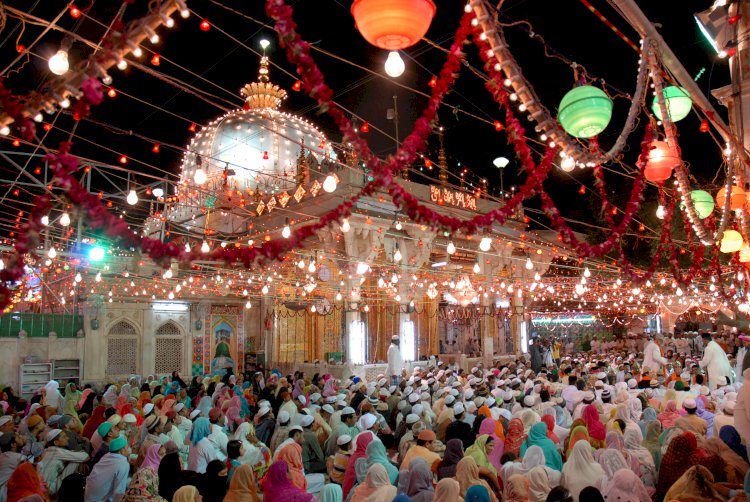




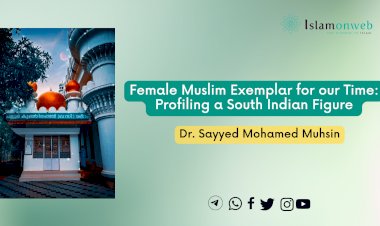
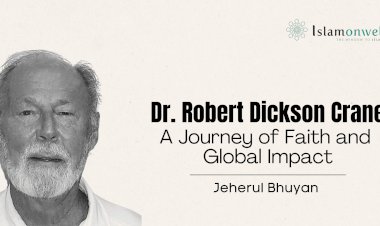
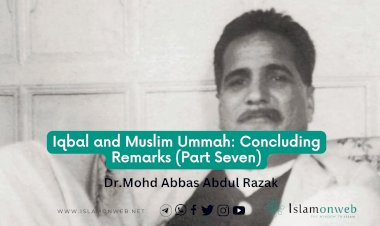















Leave A Comment